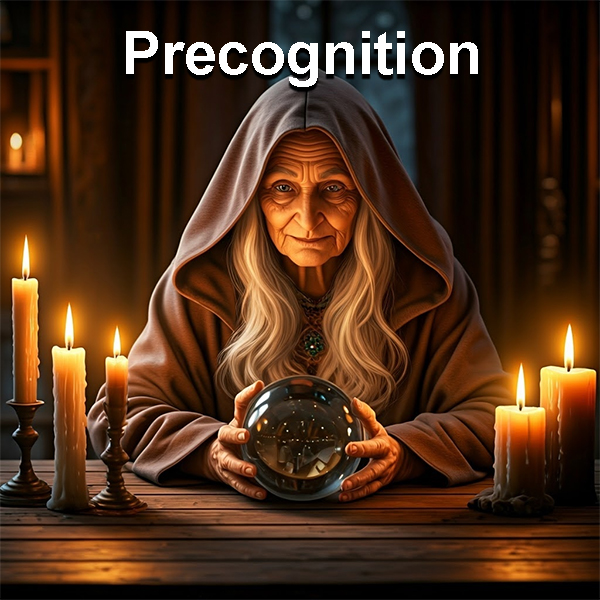 Precognition, I’m sure you’ve heard of it: the mysterious, mystical ability to foresee the future. You know, that moment when a friend casually mentions they had a vivid dream about you winning the lottery, or when someone says they knew something was going to happen before it did.
Precognition, I’m sure you’ve heard of it: the mysterious, mystical ability to foresee the future. You know, that moment when a friend casually mentions they had a vivid dream about you winning the lottery, or when someone says they knew something was going to happen before it did.
Yes, I’m talking about precognition. It can happen in several ways and take many forms. You could say it’s precognition when I’m doing tarot readings and describe a situation six months out. I love it—my clients come back and tell me, “Wow, it happened.” Trust me, I’m not just pulling that out of thin air.
It’s quite gratifying, helping someone avoid harm, improve their lives or find love or healing.
We do in-person tarot readings in our physical store, or online readings if needed, come visit! Connect with us for more on Instagram, Facebook (Meta) or TikTok.
I’m not the only one that has experienced precognition. It’s pretty clear that some people can tap into future energies, whether through dreams, visions, or feelings. Some skeptics might roll their eyes and mutter “coincidence” or “wishful thinking,” but for those of us who’ve had the experience, there’s no denying it’s a real phenomenon.
For me, it’s a little like magic—conjuring glimpses of what’s to come. And yes, I practice witchcraft (no, it’s not evil), so I’m all about working with energies and the metaphysical. As a witch, the lunar cycle, moon energies, and the Craft play a significant role in my spiritual practice.
But let’s be clear: we’re not talking about some fluffy, whimsical fantasy here. We’re talking about something that’s been studied scientifically—and sometimes, the evidence is pretty compelling.
There are many types of psychics and psychic gifts, precognition plays a role in many of these. Precognition plays a large role in divination practices.
So, What Exactly Is Precognition?
Precognition, in simple terms, is the ability to perceive or sense future events before they happen. Imagine knowing the outcome of a sports game before the final whistle blows or getting a clear vision of an upcoming personal event months in advance. It’s like watching the future unfold in slow motion, except—spoiler alert—you’re not the one making it happen.
Some people are born with this ability, others develop it over time through meditation or by honing their craft (no, not the witchy kind—well, maybe a little). And just because you’ve never had a moment of foresight doesn’t mean it’s not out there. After all, we live in a world that’s filled with energies we can’t always explain.
The universe works in mysterious ways, right? There are also tools to develop, enhance or augment precognition like tarot cards, crystal balls or pendulums.
Can We Really Predict the Future?
The idea of predicting the future isn’t new. In fact, for centuries, people have claimed to have precognitive abilities. But what does science say about it? According to some studies, there’s evidence to suggest that precognition may actually be a thing, even if it’s a small, often overlooked one.
Take, for example, the story of John Godley in 1946. He was a student at Oxford University when he had a dream about horse race winners. The next day, he discovered that the horses he had dreamed about were actually running that day. And get this—both horses won. Godley repeated this bizarre phenomenon several times over the next few years.
Eventually, he wrote down his predictions, sealed them in an envelope, and kept them locked away until the day of the race. The predictions came true, and he became a local celebrity.
Skeptics, of course, would say it’s all a coincidence or, worse yet, fraud. But if we look closer, we start to see a pattern. More and more people claim to have had experiences like Godley’s. They might not be betting on horse races, but they’ve felt that eerie sense of déjà vu or seen flashes of the future in dreams.
Precognition in Science
I know, I know—science isn’t exactly lining up to embrace precognition as an everyday reality. But here’s the kicker: there are actual scientific studies that have investigated the possibility. You’re probably thinking, “Sure, but science has to explain everything, right?” Well, here’s the deal. Scientists have conducted a number of studies on precognition and similar phenomena, and they’ve found something interesting.
In 2014, a study involving 10 participants predicted the movement of the Dow Jones Industrial Average—an important stock market index. In all seven trials, the predictions were accurate, and the participants collectively made a profit of $16,000.
This is just one example, but there’s more. In a 2017 study, 15 participants with some known psi abilities correctly predicted the movement of the German stock market in 38 out of 48 trials. That’s a solid 79.16% accuracy rate.
Now, before you start imagining us all living in mansions and swimming in cash, there’s a catch. If humans can predict the future, why aren’t we all rich by now? Good question. The answer lies in something called “effect size.” My advice is don’t go chasing money, greed and materialism can make you sick. If riches happen, they happen.
There’s no harm in being well-off, but prosperity is better; simply having what you need. I do little money magic here and there as needed, sure. But I won’t fall into the trap of greed, I believe greed is evil and the source of many evils in the world.
The Issue of Small Effects
While the results of precognition experiments are consistently positive, they tend to be small—often too small for skeptics to take seriously. However, let’s break this down: just because the effect is small doesn’t mean it’s insignificant. In fact, the data shows that small but consistent results—across different types of studies and people—are still enough to suggest something real is going on.
A 1989 meta-analysis of 309 precognition studies involving over 50,000 participants found a statistically significant success rate. That’s a lot of data to ignore, right? More recent studies have built on this, with one meta-analysis in 2012 showing even stronger positive results.
And here’s where it gets interesting: when you compare the effect sizes of psi research with other areas of psychology, they’re on par with studies of things like aspirin’s effectiveness or polio vaccines.
To put it bluntly, these studies consistently show that the results of precognition experiments are not just flukes. They’re real enough to be considered credible by those who aren’t immediately dismissing them as “pagan mumbo jumbo.”
The Spiritual and Metaphysical Aspects of Precognition
For me, precognition isn’t just a cool party trick or a convenient way to predict lottery numbers. It’s deeply tied to the metaphysical and spiritual dimensions of existence. As a witch, I’ve spent years learning how to tap into different energies. Magic, whether it’s lunar or solar, involves attuning yourself to cosmic rhythms. For some of us, tapping into future energies is just another form of this spiritual practice.
The Craft, as I like to call it, teaches us to trust our intuition. Over time, this intuition sharpens, almost as if we’re tuning into a spiritual frequency that reveals future possibilities. Think of it like walking into a room where everything feels just a little bit off. Maybe you don’t have all the answers yet, but something’s about to happen—and you just know it.
It’s no coincidence that many witches and metaphysical practitioners report heightened intuitive abilities, including precognition. Whether we’re doing a spell, reading tarot, or simply meditating under the moon’s light, we are working with energies that might give us a glimpse into what’s ahead.
Why Doesn’t Everyone Have Precognitive Abilities?
Here’s a question that’s been bugging me for a while: if precognition is real, why can’t everyone do it? The answer is simple—and a little frustrating. Like any other talent, it varies from person to person. Some people might have strong intuitive abilities, while others may not even notice the subtle signs of the future.
It’s not that precognition is an exclusive club; it’s just that some of us are more attuned to the energies that reveal the future.
But here’s the good news: we can all develop our own psychic abilities, with practice. Whether you practice witchcraft, meditate, or simply pay closer attention to the small signs around you, it’s possible to increase your sensitivity to precognitive experiences.
The universe is constantly sending us messages, but most of us are too distracted to catch them. The key is learning to listen. There are meditations and exercises that can help you develop your intuition.
Final Thoughts
So, is precognition real? Based on personal experiences, scientific studies, and a deep belief in the metaphysical, I’d say it’s definitely something worth exploring. You don’t have to be a witch or a Wiccan to tune into these energies, but it certainly helps if you’re open to the idea. Whether you’re a skeptic or a believer, it’s clear that there’s more to our reality than meets the eye.
As for me, I’ll keep doing my tarot readings, manifesting good energy, and seeing what the universe has in store. Maybe you’ll catch a glimpse of the future, too—if you know where to look.
References
Smith, C. C., Laham, D., & Moddel, G. (2014). Stock Market Prediction Using Associative Remote Viewing by Inexperienced Remote Viewers. Journal of Scientific Exploration, 28(1). Retrieved from Journal of Scientific Exploration.
Müller, M., Müller, L. & Wittmann, M. (2019). Predicting the Stock Market: An Associative Remote Viewing Study. Zeitschrift für Anomalistik Band 19 (2019), S. 326–346.
Honorton, C., & Ferrari, D. C. (1989). “Future telling”: A meta-analysis of forced-choice precognition experiments, 1935-1987. Journal of Parapsychology, 53, 281–308.
Mossbridge J, Tressoldi P and Utts J (2012) Predictive physiological anticipation preceding seemingly unpredictable stimuli: a meta-analysis. Frontiers of Psychology 3: 390.
Bem, D. J. (2011). Feeling the future: Experimental evidence for anomalous retroactive influences on cognition and affect. Journal of Personality and Social Psychology, 100, 407–425.
Bem, D., Tressoldi, P. E., Rabeyron, T. & Duggan, M. (2014). Feeling the Future: A Meta-Analysis of 90 Experiments on the Anomalous Anticipation of Random Future Events (April 11, 2014).
Roe. C. (2021). ‘Small Wonder: Effect Sizes in Parapsychology.’ The magazine of the society of Psychical Research, pp. 4-5, p.4.
Schäfer, T., & Schwarz, M. A. (2019). The Meaningfulness of Effect Sizes in Psychological Research: Differences Between Sub-Disciplines and the Impact of Potential Biases. Frontiers in psychology, 10, 813.
Rosnow, R. L., & Rosenthal, R. (2003). Effect sizes for experimenting psychologists. Canadian Journal of Experimental Psychology/Revue canadienne de psychologie expérimentale, 57(3), 221–237.
Utts, JM, “An Assessment of the Evidence for Psychic Functioning” in Journal of Scientific Exploration, 10(1), pp. 3–30, 1996, p.3






I think precognition is real but we just havent figured out how to tap into it fully yet. Like, maybe our brains are capable of way more than we realize. Just my two cents!
Interesting theory, I think little by little we are evolving to greater psychic capacity. I do believe that we can train ourselves and develop psychic abilities.
I think precognition is just like Charmed Ones tv stuff. We cant predict the future. Focus on the present.
Keep an open mind; you never know what the future holds. Dont dismiss possibilities so easily. I have had many experiences in life where I knew something before it happened. I also know many who have experienced the same thing.
Thanks Louise – me too, I’ve experienced a lot in life and in my circles, there’s not one person I know who hasn’t experience precognition. And its just one of many psychic talents.